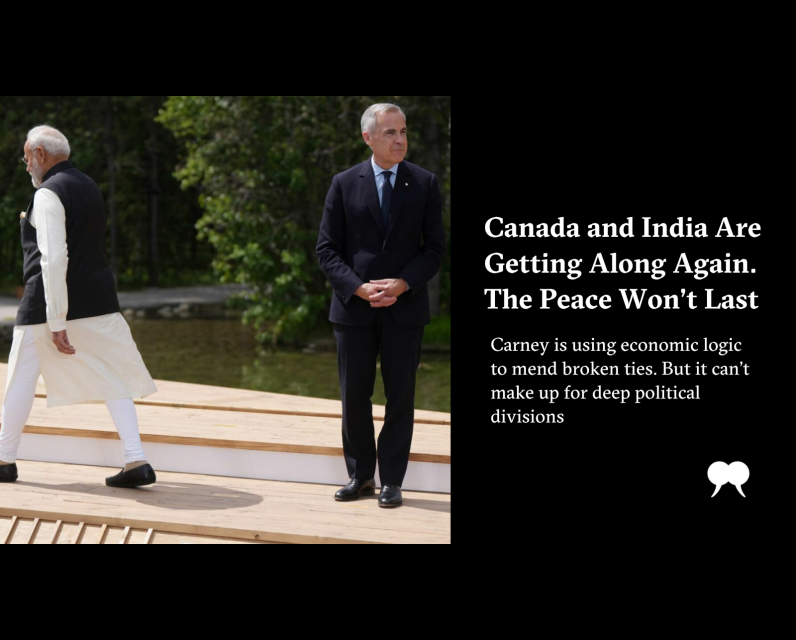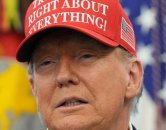Canada and India Are Getting Along Again. The Peace Won’t Last

Nestled in the pine-clad peaks of Kananaskis, Alberta, the G7 convened in June with a heavy agenda. Officially, the summit focused on urgent questions of peace, energy, security, and new partnerships; unofficially, all eyes were on a carefully managed encounter between the leaders of two countries whose relations had nearly collapsed months prior. I am referring to the meeting between Canadian prime minister Mark Carney and—not Donald Trump—Narendra Modi.
Carney’s invite to his Indian counterpart, despite ongoing investigations into the killing of Hardeep Singh Nijjar, raised more than a few eyebrows. It came months after relations between the countries went into deep freeze, with then prime minister Justin Trudeau alleging in Parliament in 2023 that the Indian government was behind the murder on Canadian soil. New Delhi accepted the invite readily. Ottawa reciprocated by going out of its way to avoid any disruption of the constructive mood for the meeting: the Canadian Security Intelligence Service annual report for 2024 was tabled in Parliament on June 13, two days before the G7 summit, but was published five days later. The strategic delay meant it was available only a day after the summit had concluded.
The report details systematic efforts by India, including its “Canada-based proxy agents,” to influence “Canadian communities and politicians.” These activities, it adds, “attempt to steer Canada’s positions into alignment with India’s interests on key issues.” The report also accuses India of conducting transnational repression against perceived dissidents. But all this remained buried when Carney met Modi. Both sides pretended to ignore the elephant in the room—and it seemed to work.
The meeting produced the expected diplomatic choreography, including agreements to restore high commissioners in both capitals and to resume trade talks. Yet Carney dodged direct questions about Nijjar’s murder, offering only that he needed to be “careful” about commenting on the judicial process. Modi, meanwhile, spoke in platitudes about democratic values and economic co-operation while making no concrete commitments on the core Canadian concerns about transnational crime.
The smiles and firm handshakes couldn’t mask the underlying reality that this diplomatic rapprochement is built on economic and political expediency, not genuine reconciliation. Carney’s invite marked a pragmatic pivot from Trudeau’s tough approach, but it has left the fundamental issues driving the bilateral crisis unresolved. There has been neither a reset nor a reboot.
The rationale behind Carney’s decision is transparently utilitarian. As the former central banker told reporters, it’s “hard to have those discussions”—on energy security, critical minerals, and artificial intelligence, three of his stated priorities for the G7 summit—“without India.” This pragmatism reflects his background as a seasoned economist who, through his role at Brookfield Asset Management, understands India’s growing economic importance. Brookfield manages approximately $30 billion (US) in Indian assets across multiple sectors, giving Carney intimate knowledge of the market’s potential. That India’s potential has been highlighted for over two decades but still remains unfulfilled—with the country consistently failing to achieve double-digit GDP growth like China, elimination of extreme poverty, or structural reforms to enable broad-based prosperity—should, however, strike a note of caution in Carney’s team.
The domestic fallout from the invite to Modi was immediate and severe. The Ottawa-based World Sikh Organization called it “a direct insult to the Sikh community and a grave threat to the integrity of Canada’s institutions.” Some politicians accused the prime minister of undermining Canada’s reputation for human rights, though others, like international trade minister Maninder Sidhu and parliamentary secretary for international trade Yasir Naqvi, supported the decision as necessary for economic diversification in the face of Trump’s trade war and annexation threats.
This split reflects the broader challenge facing Canadian policy makers. They need to balance moral imperatives about securing criminal justice in Canada with the country’s economic requirements in an increasingly complex global landscape. Carney pressed ahead, evidently driven by the stark reality that India represents the world’s fifth largest economy and a crucial link in global supply chains for Canada.
On its part, the Indian government projected the invite as a significant diplomatic triumph. But both sides’ versions of the talks showed one substantive difference. Canada’s statement specifically mentioned an “agreement to continued law enforcement dialogue and discussions addressing security concerns,” while India’s readout completely omitted any reference to law enforcement or security issues. If Carney said something, Modi had not heard it—or pretended not to have heard it.
Modi’s statements were carefully crafted to project reasonableness while avoiding any substantive pledges. He described the talks as “excellent” and identified trade, energy, and critical minerals as areas of potential co-operation. “India and Canada relations are very important in many ways,” he told Carney, emphasizing the democratic values both countries share. He also expressed gratitude for the opportunity to “connect with the people of Canada” after a ten-year absence. The language subtly reminded Canadian audiences of India’s large diaspora and economic influence. The Indian government’s public statements through its foreign ministry spokesperson also framed the meeting as an opportunity to “reset the relationship based on mutual respect, shared interests and sensitivity to each other’s concerns,” shifting responsibility to Canada to be more “sensitive” to Indian concerns.
At the same time, the Indian side offered nothing concrete on the core issues troubling Canada. There was no acknowledgment of the allegations around Nijjar’s assassination, no promise to co-operate in investigations, and no mention of reining in the alleged activities of transnational repression.
Carney seemed to play along, choosing not to ruffle feathers by reminding India why the bilateral ties had deteriorated in the first place. While he mentioned the two sides agreeing to “continued law enforcement to law enforcement dialogue,” this falls far short of the kind of robust legal framework that exists between other democratic allies. India has mutual legal assistance treaties with numerous countries, including the United States, that provide clear procedures for co-operation in criminal investigations. The absence of any discussion about establishing formal legal mechanisms to address transnational crime only underscores that both sides are more interested in sidestepping the crisis than resolving it.
India’s conditional approach to co-operation reveals the structural nature of the problem. Sanjay Kumar Verma, India’s then high commissioner to Canada, had said in early 2024, “Unless we see something relevant and specific, it would be extremely difficult for us to do anything to help the Canadian authorities.” This circular logic—no co-operation without evidence, but no access to evidence without co-operation—illustrates the Catch-22 that has come to define the bilateral relationship and is preventing any real diplomatic thaw.
The Modi–Carney bonhomie represents a stark contrast to the toxic relationship between Modi and Trudeau, as witnessed during their last meeting, at the G20 summit in New Delhi in 2023. Modi was unwilling to listen to Trudeau, with their relationship having broken down after Trudeau’s disastrous India visit in 2018. But he is open to engaging Carney in the hopes of burying the skeletons of the past. Even then, there is hardly any personal chemistry between the two leaders: one a right-wing Hindutva authoritarian demagogue who has been in power for over eleven years, the other a liberal technocrat who only recently entered politics as the prime minister of Canada.
The problem is exacerbated by electoral politics in both countries. Carney runs a minority government, and Sikh voters in key constituencies could determine his party’s future. His party’s supporters also believe in the rule of law and the idea of criminal justice. Modi’s party no longer has a parliamentary majority on its own, but its Hindu nationalist agenda has no meaningful political programs to address Sikh concerns or to win them over electorally. Modi boasts about taking action to “kill enemies inside their homes,” and his support base doesn’t care about the precipitous fall in India’s democratic credentials across global indices under his reign.
The factors underlying the India–Canada dispute come into sharp focus when examining the CSIS report. It describes India as one of the “main perpetrators” of foreign interference and espionage in Canada. The intelligence agency warns that “Canada must remain vigilant about continued foreign interference conducted by the Government of India, not only within ethnic, religious and cultural communities but also in Canada’s political system.” A particularly detailed assessment concerns the 2022 Conservative Party leadership race, where, according to a March Globe and Mail report quoting a CSIS source, Indian agents were found to be involved in fundraising and organizing within the South Asian community to support Pierre Poilievre.
CSIS explicitly states that the Royal Canadian Mounted Police has evidence linking Indian government agents to “criminal networks to sow violent activity in South Asian communities in Canada.” The report adds that “links between the Government of India and the Nijjar murder signals a significant escalation in India’s repression efforts against the Khalistan movement and a clear intent to target individuals in North America.” This represents what CSIS describes as transnational repression playing “a central role in India’s activity in Canada.”
Under Modi’s continued leadership, the report predicts, “India’s political course will be a continuation of a Hindu-nationalist policy agenda that has been implemented since Prime Minister Modi was first elected in 2014.”
In the aftermath of the Carney–Modi meeting, none of this got any attention in India, because the CSIS report also officially acknowledged, for the first time, that “Khalistani extremists . . . continue to use Canada as a base for the promotion, fundraising or planning of violence primarily in India.” This acknowledgment represented a notable departure from previous reports, which omitted references to Khalistani extremism entirely, and it was grabbed with both hands by large sections of Indian media to portray it as a big win for Modi.
In fact, the report presents a complex narrative where some Canada-based Khalistani activities serve as both a driver and justification for Indian government interference operations. This creates a situation where each side’s legitimate security concerns fuel the other’s problematic responses. Canadian tolerance for pro-Khalistan political activities, which are seen as political advocacy protected by constitutional freedoms, creates space for some extremist elements to operate. India’s response to these activities—terming them seditious threats to territorial integrity and national security, to be tackled mostly with inappropriate interference methods—further complicates bilateral relations.
This creates an impossible dynamic where India views lawful Canadian political activities as national security threats requiring extraordinary countermeasures. Modi has built his electoral success partly on projecting strength against separatist movements in non-Hindu-majority Indian regions like Kashmir, making any appearance of weakness on Khalistan politically costly.
New Delhi and Ottawa have both convinced themselves that robust economic ties can somehow overcome these deep political divisions. Trade ministers speak optimistically about resuming negotiations, while business leaders tout the potential for increased investment. Canadian foreign affairs minister Anita Anand has said the economy is becoming the primary focus of Canada’s relationships in the Indo-Pacific. Yet this economic focus ignores the reality that political tensions inevitably spill over into commercial relationships.
More fundamentally, the economic argument for closer ties may be overstated. While India represents a large market, Canadian businesses face significant challenges there, including regulatory barriers, infrastructure constraints, and intense competition from established players. The promise of economic diversification away from the US, while appealing in theory, faces practical limits given Canada’s geographical realities and existing supply-chain relationships deeply integrated with the US.
The numbers also tell a sobering story. Despite decades-long efforts to foster economic ties, bilateral trade between Canada and India reached only $30.9 billion in 2024, a fraction of what might be expected between such large economies—Canada–China trade, for instance, stands at $117 billion. Previous attempts to negotiate free trade agreements have repeatedly stalled over political disputes, and there’s little reason to expect different results now.
The rapprochement, then, represents little more than a temporary pause in hostilities. The next crisis, whether triggered by another assassination, a particularly provocative pro-Khalistan event, or simply electoral pressures in either country, will likely send bilateral relations spiralling once again. Until both countries acknowledge this reality and develop institutions capable of managing their differences rather than simply papering over them, that next crisis is only a matter of time.
The post Canada and India Are Getting Along Again. The Peace Won’t Last first appeared on The Walrus.



Comments
Be the first to comment